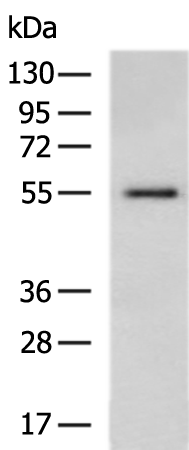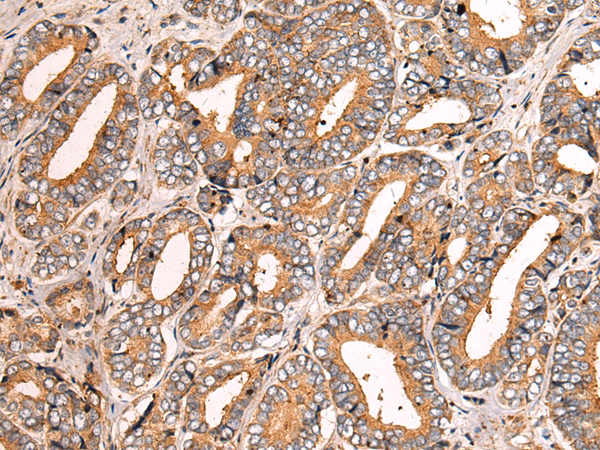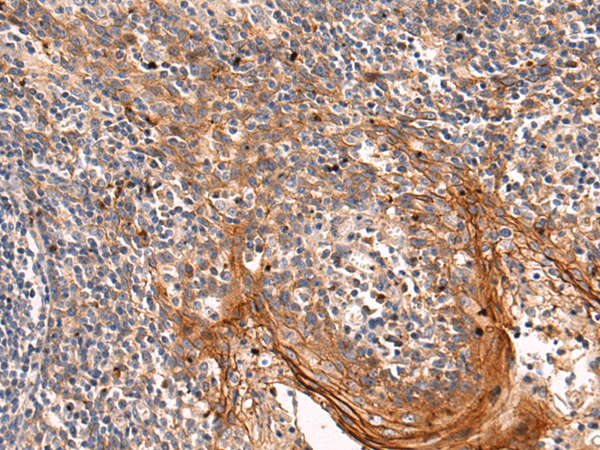


| WB | 咨询技术 | Human,Mouse,Rat |
| IF | 咨询技术 | Human,Mouse,Rat |
| IHC | 1/50-1/100 | Human,Mouse,Rat |
| ICC | 技术咨询 | Human,Mouse,Rat |
| FCM | 咨询技术 | Human,Mouse,Rat |
| Elisa | 1/5000-1/10000 | Human,Mouse,Rat |
| Aliases | A-SCS; A-BETA; MTDPS5; LINC00444; SCS-betaA |
| WB Predicted band size | 50 kDa |
| Host/Isotype | Rabbit IgG |
| Antibody Type | Primary antibody |
| Storage | Store at 4°C short term. Aliquot and store at -20°C long term. Avoid freeze/thaw cycles. |
| Species Reactivity | Human, Mouse |
| Immunogen | Fusion protein of human SUCLA2 |
| Formulation | Purified antibody in PBS with 0.05% sodium azide and 50% glycerol. |
+ +
以下是关于SUCLA2抗体的3篇参考文献(基于公开研究整理,部分信息可能需进一步验证):
---
1. **文献名称**: *Mutations in the mitochondrial SUCLA2 gene in patients with encephalomyopathy and mitochondrial DNA depletion*
**作者**: Carrozzo, R. et al.
**摘要**: 该研究首次报道了SUCLA2基因突变与线粒体DNA耗竭综合征(MDDS)的关联。作者使用SUCLA2特异性抗体通过Western blot和免疫组化分析患者肌肉组织,发现SUCLA2蛋白表达显著降低,揭示了其缺陷导致mtDNA合成障碍及神经肌肉病变的机制。
2. **文献名称**: *SUCLA2 deficiency: a novel cause of encephalomyopathy with mitochondrial DNA depletion and creatine deficiency*
**作者**: Elpeleg, O. et al.
**摘要**: 研究通过SUCLA2抗体检测患者成纤维细胞中蛋白表达水平,发现SUCLA2缺失导致脑肌酸代谢异常及线粒体功能障碍。抗体应用为诊断提供了关键依据,并强调了SUCLA2在能量代谢中的核心作用。
3. **文献名称**: *Immunoblot analysis of SUCLA2 in mitochondrial disorders: Diagnostic implications and technical considerations*
**作者**: Lambrechts, D. et al.
**摘要**: 本文系统评估了SUCLA2抗体在诊断线粒体疾病中的应用,比较了不同商业抗体的特异性。研究提出标准化Western blot流程,并证实SUCLA2蛋白水平与基因突变严重程度相关,为临床诊断提供参考。
---
**注**:若需具体文献全文或补充信息,建议通过PubMed或学术数据库检索DOI编号。实际研究中建议优先选择近5年高影响因子期刊文献。
The SUCLA2 antibody targets the succinate-CoA ligase ADP-forming β-subunit (SUCLA2), a nuclear-encoded mitochondrial enzyme critical for the tricarboxylic acid (TCA) cycle. SUCLA2 forms a heterodimer with SUCLG1 to catalyze the conversion of succinyl-CoA to succinate, coupled with ATP/GTP synthesis. This reaction links the TCA cycle to oxidative phosphorylation, playing a vital role in cellular energy metabolism.
Mutations in the SUCLA2 gene are associated with mitochondrial disorders, particularly encephalomyopathies characterized by mitochondrial DNA (mtDNA) depletion. Symptoms include hypotonia, developmental delays, hearing loss, and dystonia. The SUCLA2 antibody is widely used in research to study protein expression, localization, and mitochondrial dysfunction in patient samples or disease models.
In diagnostics, it aids in confirming SUCLA2 deficiency via immunohistochemistry, Western blotting, or immunofluorescence. Researchers also employ this antibody to explore metabolic reprogramming in cancer, as altered TCA cycle activity influences tumor progression. Its specificity and reliability make it essential for elucidating SUCLA2's role in mitochondrial biology and disease mechanisms.
×